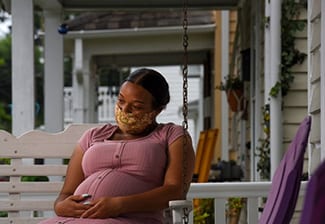New COVID studies bring some holiday cheer for pregnant women
Fortune,

At first, Kate Elden’s choices when the coronavirus pandemic beganmade her stand out. She wore heavy personal protective equipment to work at a veterinary clinic, despite the worries of some of her colleagues that she would scare off clients. She decided against enrolling her toddler in preschool. And after a while, she decided to place her medical career on hold entirely, opting to “hunker down and play it safe,” as she told me over the phone, by essentially staying at home.
Looking back, Elden’s decisions may appear both responsible and prescient. But at the time, the veterinary physician knew something that her friends and professional acquaintances did not: She was pregnant in the age of COVID-19. The uncertainty that came with that was very real.
“We didn’t know the risks of preterm delivery, or what some of the longer-term effects of the virus might be,” said Elden, 35, who in October delivered a healthy son, her second. “It just wasn’t worth the risk of anything happening to my baby.”
Across the U.S., the prospect of being pregnant during a pandemic has wrought understandable stress. According to the Centers for Disease Control and Prevention, more than 47,000 cases of COVID-19 among pregnant women were reported by mid-December, with 58 deaths. The New York Times, meanwhile, noted preliminary data of a study indicating that 60% of pregnant women were experiencing enough nervousness and anxiety that it “impedes their everyday functioning.”
Stephanie Gaw, an assistant professor at UC–San Francisco, told me over the phone about another complicating factor among some of her patients: They’re not first-time moms. In addition to COVID concerns, these women also are dealing with other children in the home, perhaps tending to their educations, and trying to manage a pregnancy while often being fearful of making an in-office visit to their doctor. “It’s a really, really tough time for everyone right now,” Gaw said.
All the better, then, that recent studies have brought some good news for pregnant women during the pandemic. At a time in which it’s difficult to declare anything definitively, both the numbers and the emerging clinical guidance are encouraging.
The data so far suggests that pregnant women are not any more susceptible to COVID infection than nonpregnant women. Further, a meta-analysis of 9,000 pregnant women with COVID found that most experienced only a mild illness. Another study of 23,000 pregnant women who had symptomatic COVID-19 found that the absolute number of women at increased risk for having severe outcomes is low. And many pregnant women who are COVID-positive have no symptoms: One large systematic review found that 95% were asymptomatic at testing, and 59% remained asymptomatic at follow-up.
There are still areas of concern, of course. For example, we know from prior studies that pregnant women with COVID-19 have a higher risk of contracting more severe disease than women who are not pregnant. And as with the general population, pregnant women who have comorbidities, such as diabetes or obesity, appear to be at greater risk of severe illness. Black and Hispanic individuals, in particular, have a higher incidence of both developing COVID-19 and dying from it.
What about the babies themselves? Has there been an increase in either stillbirths or preterm deliveries, for example, perhaps owing to stress, lockdowns, or fewer prenatal visits? In a study conducted in England and published this week, researchers reported no evidence of an increase in fetal stillbirths either regionally or nationally during the pandemic versus the same time period last year. (The researchers did not separate out maternal COVID infection status.) This is certainly reassuring news for pregnant women, especially given that some women may be hesitant to access maternal health services with a virus raging within hospitals and clinics.
A second study carried outat two Philadelphia hospitals likewise did not find significant changes in either the rates of preterm births or stillbirths in a racially diverse group of patients.
Both studies are limited to a single health care system, and Gaw noted that the quality of each system has a marked impact on perinatal outcomes. “I think we still don’t know how much COVID itself can cause pregnancy loss, but it is still a very rare outcome,” she said. “The data is still very young.”
When limited to COVID-positive women, the numbers can look different. A systematic review of over 9,000 women in China, all of whom had COVID-19, found that around 30% of the women experienced preterm delivery—quite high compared with usual reported rates of between 5% and 18%. Research from prior virus outbreaks, like SARS and MERS, demonstrated similar percentages of pregnant patients experiencing preterm labor.
A recent study, performed in a racially diverse population of 252 COVID-positive pregnant women, found that viral infection during pregnancy was not associated with adverse outcomes. Importantly, no difference in preterm delivery rates was noted between pregnant women with and without COVID. The American College of Obstetricians and Gynecologists (ACOG) concludes that while more data is needed to understand outcomes for babies, the initial evidence shows preterm delivery and stillbirth rates in the U.S., as compared with periods pre-pandemic, “are unchanged.”
While a few well-documented cases have established that a COVID-positive mom can transmit the virus to her baby in the womb,Gaw said, “significant transmission is thankfully very, very rare.” In the previously mentioned review of approximately9,000 women, five out of 338 newborns tested positive for COVID, suggesting that in utero transmission may have occurred. (Only three of the infants were tested on the first day of birth, so it is possible the other two may have acquired the virus subsequently.)
Now, should a COVID-positive mom be in the same room with her baby? Can she breastfeed safely? A new study from JAMA shows support for both of these options, as long as the woman is in good clinical condition and careful droplet and hygiene protocols are maintained.
In one of the largest studies to date, performed at six maternal centers in Italy, researchers found that of 62 babies born to COVID-positive mothers, there were no cases where a mother with mild or asymptomatic COVID infection transmitted the virus to her infant by rooming together or breastfeeding.
While the American Academy of Pediatrics initially recommended that mom and baby be separated to potentially protect the baby, the Italian study found only one instance where an infant developed COVID a week after being born. That infant had been rooming and breastfeeding with a mother who became seriously ill on day five postpartum, requiring ICU admission.
These encouraging results mirror those of a study of 120 infants cared for in three New York City hospitals, where mothers with COVID took safety precautions and roomed with their infants (who slept in closed isolettes), and the majority breastfed. None of the approximately 70% of infants who were tested five to seven days after birth were positive for the coronavirus; neither did any of the infants develop symptoms. Meanwhile, in a literature review of outcomes of infants born to infected mothers, researchers concluded that newborns “rarely acquire the disease or show adverse clinical outcomes.”
While viral RNA has been found in breast milk in a few instances, to date no evidence has been found that the coronavirus is capable of either replicating or being transmitted through breastfeeding. On the contrary, a small study of 15 lactating mothers who recovered from COVID found that their breast milk had antibodies to the SARS-CoV-2 spike protein.
Moreover, a growing body of evidence suggests possible transfer of these antibodies to babies from infected mothers. In two small studies from China and Singapore, researchers detected the presence of antibodies in infants born to women with the coronavirus. Further investigation is needed to determine whether it’s possible that previously infected, lactating mothers might be able to share protective immunity with their babies.
Should a pregnant woman get vaccinated? On this front, we don’t have safety data, but ACOG recommended this month that COVID-19 vaccines like Pfizer’s or Moderna’s “not be withheld from pregnant individuals who meet criteria for vaccination,” nor from those who are breastfeeding. The organization suggests that women make decisions in conjunction with their clinical care teams. (Vaccines have been given safely to pregnant and breastfeeding women for decades.)
Gaw said pregnant women “should definitely consider getting the vaccine. Based on what we know about the technology of the vaccine, the risk of anything bad happening is really, very, very low.”
Peter Bernstein, the maternal fetal medicine director at Montefiore Medical Center, said he counsels women to consider their own risk of becoming infected with COVID, as well as what risk factors they, and others close to them, have for experiencing severe complications from the virus. “How I would counsel a pregnant person who works in an emergency department would be very different from someone who lives alone and works from home,” Bernstein wrote in an email.
Understandably, pregnant women often are excluded from initial research trials for safety reasons, so evidence will continue to accumulate. So far, though, it’s good news overall for moms and babies. Most pregnant women will experience only a mild illness if they develop COVID, the majority will carry their baby to term and have a normal delivery, and it’s extremely unlikely that a baby will develop COVID in utero if mom does become infected. Moreover, mom and newborn can often room together, and mom may be able to breastfeed with appropriate precautions taken (like masking, practicing good hand hygiene, and distancing from the crib) if she is infected. These decisions should be made in conjunction with one’s health care provider.
For her part, Kate Elden said she remains “pretty cautious” with her 2-month-old son, and she made a choice—for an at-home birth with the help of a midwife—that not everyone will make, in part because her first pregnancy had been a relatively easy one.
“Care decisions need to be individualized,” she said. “For my family, I had to choose which regret would I rather live with: Would I regret being so safe that we didn’t get out and socialize, or would I regret getting coronavirus and having long-term effects from it? At the end of the day, all you have is your health, so my suggestion is to play it safe.”
It’s certainly a personal decision. Nicole Gats, a nurse, works shifts at Anne Arundel Medical Center in Annapolis. At 32 weeks pregnant, she continues to care for patients on a non-COVIDmedicalfloor, where she wears an N95 mask and face shield “because you never know,” she said in a phone interview. She often exercises outside in 20- to 30-degree weather, and has a go bag packed as she plans to deliver her child at Anne Arundel’s labor and delivery unit.
As with so much about this virus, more studies are needed to grow our knowledge base, better understand how to medically manage pregnant women with COVID-19, and best protect infant health. In the meantime, for those already pregnant (and almost certainly stressed about it), know this: The early evidence is encouraging. In a fearful year, that is perhaps the best gift you can receive.
